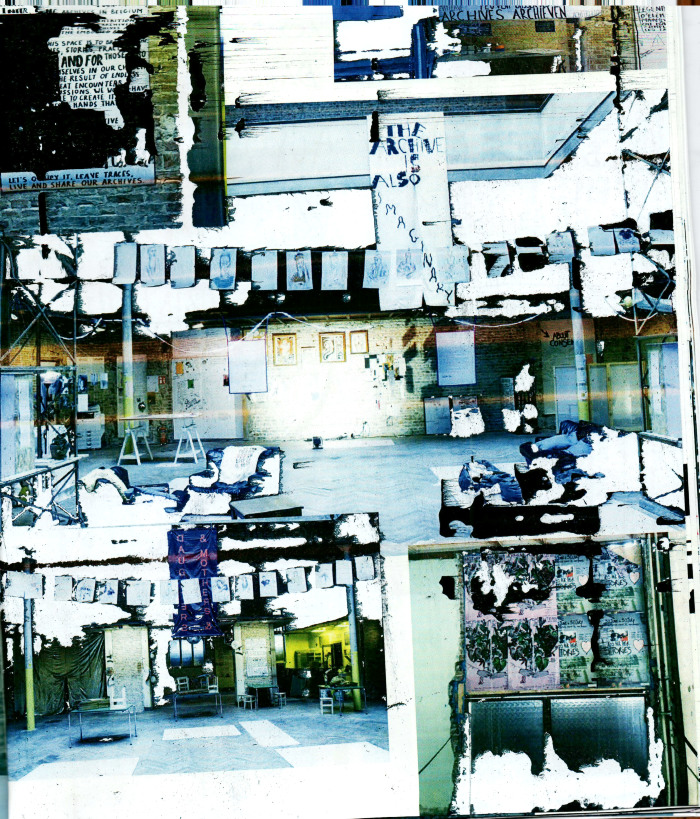FRArt Archiving as a collective and activist reappropriation praxis
- is created by Nour Outojane
- is created by LoupKass
1. A page from the issue documenting the month spent in the archives (July 2022)
- has as creator Nour Outojane
- has as creator LoupKass
- type: Image
- ref: DOC.2023.77
- Creation date: November 1 2023

- A page from the issue documenting the month spent in the archives (July 2022)
- ACAREPraxis - image (1).jpg
- image/jpeg
- 6.01 MB
- download
2. Archiving as a collective and activist reappropriation praxis: introduction
- has as creator Nour Outojane
- has as creator LoupKass
- type: Article
- ref: DOC.2023.78
- Creation date: November 1 2023
-
description:
Archiving as a collective and activist reappropriation praxis is an experimental, artistic, activist, and collective research project that explores how trans* persons in Belgium can reclaim their histories through 1) Belgian institutional archives, 2) their personal archives, and 3) the intangible realm of ideas, representations, narratives, and emotions they possess.
This research project is initiated by LoupKass and Nour Outojane. LoupKass works with black and white medium format analog photography and camcorders to archive their surroundings, loved ones, and community. Nour is a multidisciplinary artist and researcher, with their artistic practice (in digital illustration, video, and installation) informing their research, and their research (in cultural studies, gender studies, and sociology) finding a space for experimentation within their artistic practice. We are both trans* and have worked on archive-related projects in various personal and collective projects, including the His/her/their Stories project, on which we collaborated with the Mothers & Daughters collective and the Genres Pluriels association since December 2021. His/her/their Stories was a project in which we created a collective and interactive space that was ever-evolving over a month.
The research we propose is inspired by the work of various academics and is informed by the His/her/their Stories project; it naturally flows from it. In preparing the archival space for the His/her/their Stories project, we conducted research in the archives of the Archiefpunt du Fonds Suzan Daniel, AMSAB-Isg, AVG-Carhif, and the Rosa library. We were confronted with the epistemological and administrative violence of institutional archives.
The power dynamics that underlie the exclusion and invisibility of trans* people have shaped the archival collections of institutions historically tasked with monitoring, controlling, and/or punishing them (police, administration, medicine, etc.). Indeed, archives about trans* individuals found in institutional archives shed light on the violence they have endured, but they still invisibilize many of them and their experiences, presenting them only through the lens of these institutions' interests, both cognitively and practically. Constructing a trans* collective memory must, in our view, involve a process of reconstructing and reappropriating institutional archives which can only be achieved collectively.
This research project explores how we can legitimize our practices, experiences, and knowledge to harness our archival power (cf. Sam Bourcier). To do so, we propose to demystify archiving as a practice confined to historians, defining it instead as an artistic, collective, and activist practice. Each of us can archive and create archives. Our research is therefore organized around the following question:
"How can seizing archiving as a collective, artistic, and activist practice empower trans* persons in Belgium to reclaim their histories, using 1) Belgian official archives, 2) their personal archives, and 3) the intangible realm of ideas, representations, narratives, and emotions they possess?".To answer this question, the research is divided into three phases. The first phase involves tracing trans* individuals in institutional archive collections and learning from activists and collectives working with trans*, LGBTQIA+, or queer archives. The second stage consists of three three-day residencies in private locations outside the city, during which six trans* artists and activists, including ourselves, will self-organize and explore methods of reclaiming our histories. The third research phase includes 1) the creation of fanzines documenting our residency experiences and 2) three history reappropriation workshops held during the residencies and tailored to new audiences. We hope this approach will create a sense of community around archive-related issues, anchor us in our past, and strengthen us in our current and future struggles.
*By referring to trans* individuals, we encompass all individuals whose gender identity does not align with the gender assigned to them at birth. The use of the asterisk after "trans" is a way to use an abbreviated expression to encompass a variety of diverse identities, including but not limited to genderqueer, intersex, non-binary transfeminine, gender-non-conforming, trans men, etc.